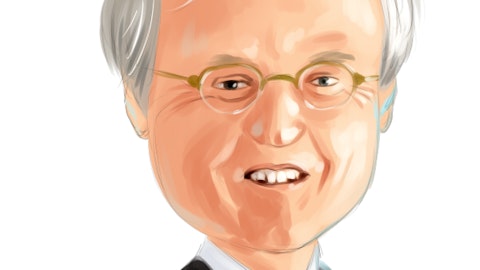Retirement Dividend Stock: Verizon Communications Inc. (NYSE:VZ)
Verizon Communications Inc. (NYSE:VZ) is the largest wireless carrier in the United States.
The company satisfies the high yield requirement retired investors need. Verizon currently has a 4.3% dividend yield.
Verizon’s operations are similar to a utility. The company provides recurring communication services that are difficult to go without in today’s connected world.
What differentiates Verizon from most utilities is its faster growth rate (in comparison). The company has compounded earnings-per-share at 5% over the last decade.
Growth has been faster in recent years. The company grew adjusted earnings-per-share 19.1% in fiscal 2015. Growth was driven primarily by margin expansion from divesting old business lines and acquiring more profitable operations.

Source: Verizon Q4 2015 Results Presentation, slide 6
Verizon recently acquired AOL to build a digital and video growth platform centered on mobile users which will be monetized through advertising. The company is in the early stage of monetizing its content platform through its Go90 app.
Verizon’s long-term growth driver is increased data usage. As data use continues to grow, the company’s wireless services will be in more demand.
Over the long run, I expect the company to grow earnings-per-share by at least 6% a year. This growth combined with the company’s current 4.3% dividend yield gives investors double-digit expected total returns.
The company’s long-term growth is protected by a strong competitive advantage. Verizon and AT&T together control over 80% of the wireless market in the United States. The telecommunications market has high barriers to entry which inhibit competition due to the large up-front costs of building a network. Additionally, spectrum auctions prohibit competition. Verizon spent $10 billion in the latest spectrum auction (which raised $44 billion total for the US government).
The company’s competitive advantage has led to 32 years of dividend payments without a reduction.
Verizon Communications Inc. (NYSE:VZ) stock is currently trading for a price-to-earnings ratio of just 13.1. The company’s low price-to-earnings ratio does not seem warranted given the company’s strong competitive advantage and double-digit total return potential.
Follow Verizon Communications Inc (NYSE:VZ)
Follow Verizon Communications Inc (NYSE:VZ)
Receive real-time insider trading and news alerts
Retirement Dividend Stock: AT&T Inc. (NYSE:T)
AT&T Inc. (NYSE:T) business model is very similar to Verizon’s. AT&T is the other large player in the United States wireless industry.
Like Verizon, AT&T has a high dividend yield. AT&T’s dividend yield is even higher than Verizon’s. The company has a high 5.0% dividend yield.
In addition to having a higher dividend yield than Verizon, AT&T also has a better dividend streak. AT&T has paid increasing dividends for 32 consecutive years. This makes AT&T a member of the exclusive Dividend Aristocrats Index.
No business can increase its dividend payments for 32 consecutive years without having a strong competitive advantage.

AT&T’s competitive advantage is similar to that of Verizon’s. The company is one of the largest players in the oligopolistic and heavily regulated United States telecommunications industry.
The telecommunications industry has very high fixed upfront costs. In addition, spectrum option costs are measured in the billions. It would take a new entrant billions of dollars to compete with AT&T (or Verizon). This limits the amount of companies in the telecommunications industry which helps to make the largest current firms even more profitable.
AT&T’s future growth will be driven by increased data usage. The company is expanding into Mexico in an attempt to drive growth. AT&T recently acquired both Lusacell and NextelMexico for a combined $4.4 billion to gain a foothold in Mexico.
International expansion combined with organic growth will fuel growth for AT&T. I expect the company to compound its earnings-per-share at between 4% and 6% a year over the next several years. This growth combined with the company’s current 5% dividend yield gives investors expected total returns of between 9% and 11% a year.
AT&T Inc. (NYSE:T) is currently trading for a price-to-earnings ratio of just 14.2. The company’s low price-to-earnings ratio, high dividend yield, and stable business model make a compelling investment for retirees.
Follow At&T Inc. (NYSE:T)
Follow At&T Inc. (NYSE:T)
Receive real-time insider trading and news alerts





